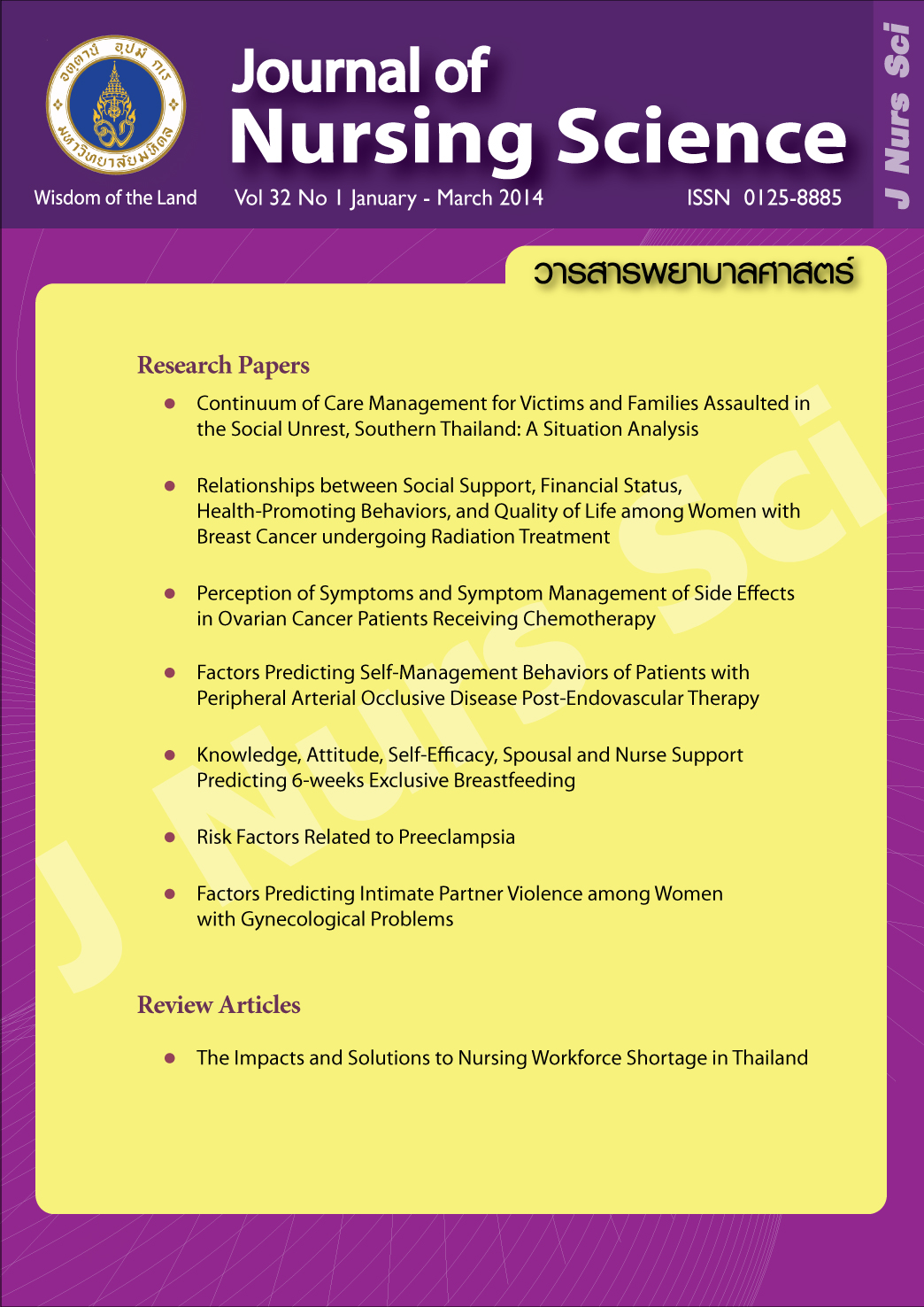Knowledge, Attitude, Self-Efficacy, Spousal and Nurse Support Predicting 6-weeks Exclusive Breastfeeding
Main Article Content
Abstract
Purpose: To investigate the predictive power of age, knowledge, attitude, self-efficacy, spousal or relative support, and nurse support on 6-weeks exclusive breastfeeding in primiparous postpartum mothers.
Design: Predictive correlational research.
Methods: A sample consisted of 117 primiparous postpartum mothers and their full-term newborns in a postpartum ward, Sakaeo Crown Prince Hospital, Sakaeo province. The instruments used to collect data included seven instruments: the demographic characteristics questionnaire, the breastfeeding knowledge questionnaire, the Iowa Infant Feeding Attitude Scale (IIFAS), the Breastfeeding Self-Efficacy Scale-Short Form (BSES-SF), the nursing support for breastfeeding questionnaire, the spousal or relative support interview, and the infant feeding interview. Data were analyzed using descriptive statistics and logistic regression.
Main findings: The findings revealed that age, knowledge, attitude, self-efficacy, spousal and nurse support could explain 26.7% of variance in 6-weeks exclusive breastfeeding. However, only spousal support and self-efficacy were significant predictors. (R2 = .267, p < .05)
Conclusion and recommendations: The results suggest that nurses should enhance mother’s selfefficacy by providing knowledge and practice of breastfeeding. At the same time spouse or relatives should be included, to enabling them to provide support to the mothers.
Keywords: exclusive breastfeeding, knowledge, attitude, self-efficacy, support
ความรู้ ทัศนคติ การรับรู้สมรรถนะในตนเองและการสนับสนุนจากสามีและพยาบาล ในการทำนายการเลี้ยงลูกด้วยนมแม่อย่างเดียว 6 สัปดาห์
บทคัดย่อ
วัตถุประสงค์: เพื่อศึกษาอำนาจทำนายของ อายุ ความรู้ ทัศนคติ การรับรู้สมรรถนะในตนเอง การสนับสนุนจากสามีหรือญาติ และการสนับสนุนจากพยาบาล ต่อการเลี้ยงลูกด้วยนมแม่อย่างเดียว 6 สัปดาห์ในมารดาหลังคลอดบุตรคนแรก
รูปแบบการวิจัย: การศึกษาความสัมพันธ์เชิงทำนาย
วิธีดำเนินการวิจัย: กลุ่มตัวอย่างเป็นมารดาและทารกหลังคลอดครบกำหนด ที่หอผู้ป่วยสูติ-นรีเวชกรรมโรงพยาบาลสมเด็จพระยุพราชสระแก้ว จังหวัดสระแก้ว จำนวน 117 ราย โดยใช้เครื่องมือ 7 ชุด ประกอบด้วย แบบสอบถามข้อมูลส่วนบุคคล แบบสอบถามความรู้เกี่ยวกับการเลี้ยงลูกด้วยนมแม่ แบบสอบถามทัศนคติเกี่ยวกับการเลี้ยงลูกด้วยนมแม่ แบบสอบถามการรับรู้สมรรถนะในตนเองในการเลี้ยงลูกด้วยนมแม่ แบบสอบถามการสนับสนุนจากพยาบาลในการเลี้ยงลูกด้วยนมแม่ แบบสัมภาษณ์การสนับสนุนจากสามีหรือญาติในการเลี้ยงลูกด้วยนมแม่และแบบสัมภาษณ์การให้อาหารทารก วิเคราะห์ข้อมูลโดยใช้สถิติพรรณนาและสถิติถดถอยโลจิสติค
ผลการวิจัย: ปัจจัยที่สามารถทำนายการเลี้ยงลูกด้วยนมแม่อย่างเดียว 6 สัปดาห์ในมารดาหลังคลอดบุตรคนแรกได้อย่างมีนัยสำคัญทางสถิติ คือ อายุ ความรู้ ทัศนคติ การรับรู้สมรรถนะในตนเอง การสนับสนุนจากสามีหรือญาติ และการสนับสนุนจากพยาบาล สามารถร่วมกันทำนายการเลี้ยงลูกด้วยนมแม่อย่างเดียว 6 สัปดาห์ได้ร้อยละ 26.7 (R2 = .267, p < .05) แต่มีเพียงการสนับสนุนจากสามีหรือญาติ และการรับรู้สมรรถนะในตนเอง ที่ทำนายได้อย่างมีนัยสำคัญทางสถิติ (p < .05)
สรุปและข้อเสนอแนะ: พยาบาลควรช่วยสนับสนุนให้มารดาหลังคลอดมีความเชื่อมั่นในความสามารถของตนเองโดยการให้ความรู้ และฝึกทักษะการเลี้ยงลูกด้วยนมแม่ ในขณะเดียวกันควรนำสามีและญาติใกล้ชิดเข้ามามีส่วนร่วมในการเรียนรู้ เพื่อให้สามีหรือญาติสามารถให้การสนับสนุนมารดาในการเลี้ยงลูกด้วยนมแม่ได้
คำสำคัญ: การเลี้ยงลูกด้วยนมแม่อย่างเดียว ความรู้ ทัศนคติ การรับรู้สมรรถนะในตนเอง การสนับสนุน
Article Details
Copyright Notice: Nursing Science Journal of Thailand has exclusive rights to publish and distribute the manuscript and all contents therein. Without the journal’s permission, the dissemination of the manuscript in another journal or online, and the reproduction of the manuscript for non-educational purpose are prohibited.

Disclaimer: The opinion expressed and figures provided in this journal, NSJT, are the sole responsibility of the authors. The editorial board bears no responsibility in this regard.


